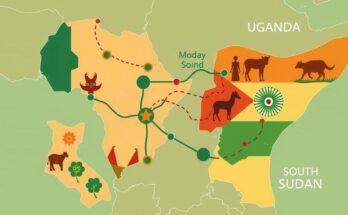Intensive negotiations involving the U.S., Turkiye, Syria, and the Kurdish-led SDF are ongoing concerning the future of Kurdish forces, with the possibility of integrating them into Syria’s defense framework. The outcome may be influenced by the stances of new administrations in the U.S. and Turkiye, against a backdrop of tensions stemming from the Kurdish groups’ perceived threat to Turkiye’s security and the quest for regional stability.
Negotiators from the United States, Turkiye, Syria, and the Kurdish-led Syrian Democratic Forces (SDF) are engaged in intensive discussions regarding the future of Kurdish forces amid geopolitical tensions. There is a possibility that an agreement may result in a modification of Kurdish forces’ operational status within Syria’s security framework. The discussions involve challenges around integrating these fighters within the newly established Syrian defense structures while also managing the territories, particularly those housing significant resources like oil and wheat.
SDF commander Mazloum Abdi asserted that a key requirement from the SDF is the establishment of a decentralized administration—a proposition that could pose complications for the new Syrian leadership aiming for centralized governance. Furthermore, he expressed unwillingness to disband the SDF, indicating a willingness to collaborate under specific military directives. In contrast, Syria’s new Defense Minister Murhaf Abu Qasra emphasized the necessity for SDF fighters to integrate into the regular Syrian forces rather than remaining an autonomous bloc.
The ongoing negotiations’ success may largely depend on the incoming U.S. administration’s stance on Kurdish support, coupled with whether Turkish President Tayyip Erdogan will curtail planned military operations targeting Kurdish militias. Turkiye has designated certain Kurdish groups as extensions of terrorist organizations, fueling tensions between Turkiye and the SDF amidst concerns regarding stability in the region.
U.S. and Turkish officials recognize the growing urgency of these negotiations following significant shifts in power dynamics in Syria since the fall of Bashar Assad. The intricate talks encompass various concurrent discussions involving different entities, emphasizing the complexity of Syrian politics. Officials have noted that achieving a truce and political agreement is crucial for the long-term stability of the region, especially in light of persistent violence and rising tensions.
The fate of Kurdish factions remains critical not only for Syria but also for Turkiye’s ongoing struggle with the PKK insurgency. The United Nations has cautioned about severe ramifications if a political solution is not achieved soon. During this precarious time, the United States continues to facilitate dialogue, balancing its commitment to Kurdish forces with its obligations to NATO ally Turkiye.
Erdogan has reiterated that Turkiye is prepared to combat terrorist factions in Syria while pushing for the cessation of armed group activities. SDF leadership has shown some openness to Turkish demands for peace in exchange for recognizing Kurdish autonomy within Syria. However, the potential for future conflict looms if significant concessions are not made on both sides, suggesting the need for cautious diplomacy moving forward. Although new leadership in Syria emphasizes the importance of unity, Kurdish factions are seeking assurance of cultural and political rights, which complicates negotiations.
The geopolitical landscape surrounding Syria is characterized by complex relationships and military actions involving various stakeholders, including the United States, Turkiye, and Kurdish forces. Since the Syrian civil war began, ethnic Kurds have gained significant power, controlling key regions amid U.S. support against Daesh. The fall of Assad has shifted the dynamics further, prompting the need for negotiations about the future of Kurdish autonomy and regional stability against potential military actions from Turkiye, which regards the Kurdish groups as security threats. The ongoing conflict highlights the importance of diplomatic solutions to ensure stability and address diverse interests in the region.
In conclusion, the future of Kurdish forces in Syria is entangled in intricate diplomatic negotiations involving the U.S., Turkiye, and the new Syrian government. As discussions progress, the stakes grow higher, with essential territorial and administrative decisions to be made. Achieving a sustainable political solution is crucial for regional stability, particularly in light of historical conflicts and prevailing tensions among the involved parties. The path forward will require significant compromises and negotiations to avoid further escalation in already volatile circumstances.
Original Source: www.arabnews.com




